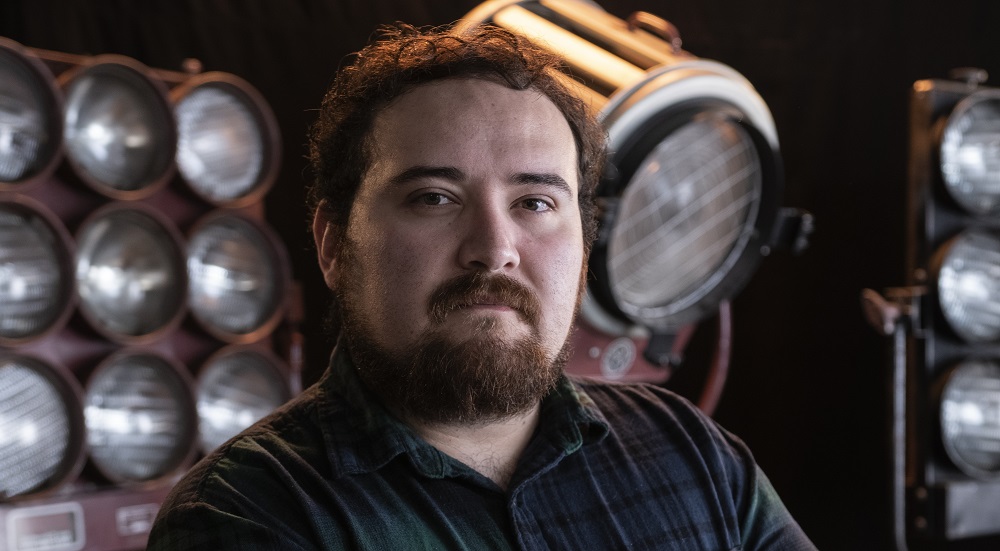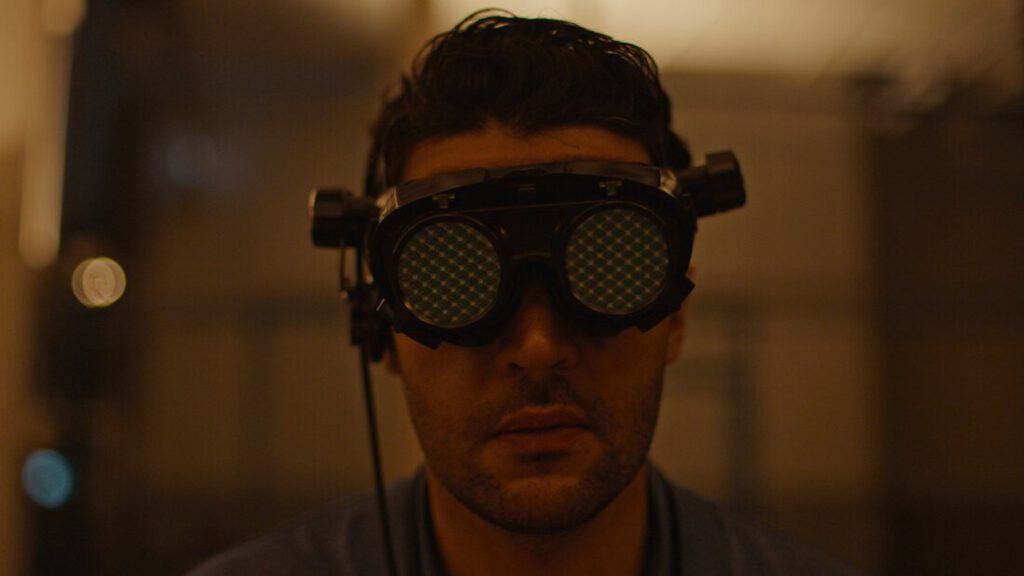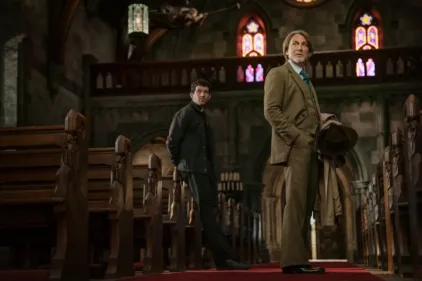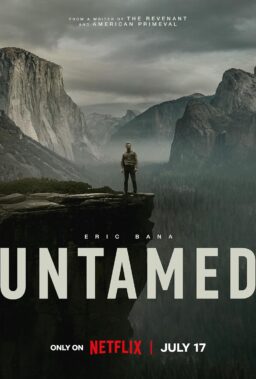In the sophomore brainchild from Canadian writer/director Brandon Cronenberg, the business of killing for hire takes on a uniquely insidious form—an assassin can take control of another body via ambiguous technology, preferably of a person close to the victim. Like a parasitic entity, the puppet master pulls the strings from within the host’s brains, eroding their will for just enough time to commit the crime. But the self-determination of the human mind is powerful, and sometimes the possessed complicate the process.
That’s the case of Tasya Vos (Andrea Riseborough), a seasoned executioner whose talents are too essential for her bosses to let spend time with her family. Tasked with the murder of a prominent businessman in the field of data mining, Vos infiltrates the judgment of his daughter’s boyfriend, Colin (Christopher Abbott). As the mission becomes unstable the consciousnesses of both the forcefully possessed and the vicious possessor engage in psychological warfare.
Living up to the family legacy, Brandon Cronenberg, son of David, plunges us into a cerebrally perverse feature boasting a brooding atmosphere. Its nightmarish imagery and gruesome sequences serve concerns about identity and self as opposed to existing for mere shock. While Cronenberg’s debut “Antiviral” examined our celebrity-obsessed culture through physical disease, “Possessor” takes his observations into a more overtly intellectual and abstract realm. We talked to him about his new brilliantly disturbing mind-bender.

First off, is the uncut version significantly longer or more violent than cut from the festival one? What’s the distinction between these two iterations of the film?
The uncut version is just the complete film in my mind. That’s the unrated director’s cut. That’s what screened at Sundance and that’s the full film. There is a cut version just because in the U.S. to get an R rating there had to be some cuts. Fortunately I’ve had a lot of support from my distributors, Neon and Well Go, to release the uncut as the lead version, but the cut, R-rated version will probably be released on some platforms that don’t allow uncut, unrated films.
One of the themes that stood out to me, at least in my interpretation, was a sense of invasiveness, not only of privacy related to data mining, but the invasion of the self and of the body in the film. What prompted those ideas?
To be honest, it came from a kind of trivial personal place I started toying with the idea while I was doing the press tour for my first feature “Antiviral.” And it’s a strange thing when you’re traveling with a film for the first time, because you’re in a sense inventing this public persona and performing a king of alternate version of yourself, some kind of media self, which then goes on to have its own weird life without you. Between that and a few other things, I was finding myself waking up in the mornings and feeling like I was sitting up into someone else’s life and having to scramble to construct a character who could operate in that context. So I wanted to make a film initially about someone who may or may not be an imposter in their own life as a way to talk about how we create characters and narratives in order to operate as human beings. The sci-fi thriller stuff came out of that out of those quieter dramatic scenes. Both “Antiviral” and “Possessor” are interested in culture, but “Possessor” has more to do with personal identity rather than any sort of social identity.
Is the violence we see Tasya Vos commit on screen more vicious given that there are no direct consequences for her since she is using another person’s body? Does that give her free range?
On a certain level maybe, because the person doing the possessing, if anything, wants that situation to end with the host dying. But part of the film is meant to be about the other consequences, the psychological consequences or the emotional consequences. If you look at drone pilots, for instance, there are drone pilots who have PTSD despite the fact that they’re the ones responsible for the violence. Even if they’re removed from the physical arena of war, they still come out traumatized through their participation in these killings, and part of that factors into the boss’ psychology in my mind.

Tell me about conceiving and executing the subconscious realm where some of the haunting images in the film materialize, and where Tasya Vos and Colin interact.
That came from a long process of experimentation. On the one hand, my cinematographer, Karim Hussain, and I are close friends and collaborators, and we worked on “Antiviral” together. And so we spent quite a bit of time playing with camera tricks in order to build out this sort of bank of ideas, playing with various gels and lenses and flares over the years. Some of those effects involved actually levitating particles using sound, using an acoustic levitator or freezing water in a practical way in-camera by running sound waves through it and syncing the sound waves up to the lenses. We had this range of practical effects on the camera side that we’d built up through years of development. And then on the make-up effects side, Dan Martin is this brilliant effects artist who I met on this film and is now also a friend and I would never want to work without him. He’s incredibly brilliant and creative and very good at making fake heads.
One of the most striking images in the film is the grotesque melting face of Tasya Vos that appears in the psychological plane. What’s the symbolism behind it for you?
In some ways it’s meant to viscerally illustrate the process of losing yourself physically and entering this other consciousness of this other body. In some cases it’s very much about the struggle between the two of them for control over the host or the ways that they sort of merge and separate their consciousnesses and have trouble differentiating their identities.
When we think about possession, in film or otherwise, the religious connotation of that concept often takes center stage. Were those otherworldly notions part of your interest at all?
For me, I guess I’m more into science than the supernatural. I do think that in film sometimes the supernatural is a very potent path towards a particular metaphor. And so there’s value to it, whether you believe in that stuff or not. But I like the idea of taking what’s interesting to me about a metaphor like that, like possession, and put it more into a science fiction context.

Both Christopher Abbott’s and Andrea Riseborough’s performances operate on multiple layers depending on which character is in control of Colin’s body. Their roles are inextricable even if at times only one actor is on screen. Was there a specific approach to how you worked with them in order to achieve these cerebral turns?
It was a long and organic process because the two of them were in a sense playing the same character or partly playing the same character. Initially there was some discussion about how we might approach it from a formal perspective. I was trying to figure out if there was some kind of more rigid structure to dealing with that aspect of the acting. For instance, did they want to be on set for each other’s scenes and watch each other? Did they want one of them to take the lead on the character and the other one mimic them in practice? Partly because they’re such fantastic actors and had so much to contribute, it was a much easier process. Initially I had certain ideas about how the characters would both merge and how Vos would take place over both performances as a character. They had their own ideas that they contributed. I understand that they were in discussions behind the scenes, a lot of checking in with each other, and discussing how Vos would behave under certain circumstances. And then of course, on set as we were shooting there were scene—by—scene conversations about the details to built it out in a very collaborative way.
Another element that’s fascinating is the merging of the two voices, and in general the way the voices inside the character’s heads further show the two forces at play. Was this decision made in post or what it something you devised earlier?
It was in the script that the voices would double up at certain times, especially when Vos was checking in with Girder, with the corporation. Getting the exact voice was an interesting process, finding the right balance between the two voices, just even the volume level. The quality of those voices took some tinkering with. Martin Pavey was the sound designer. And so I did a lot of interesting work with him and he came up with some brilliant ideas. For instance, when Girder speaks to Vos, while Vos is in the machine and her voice echoes in Colin’s head, that’s actually Jennifer Jason Leigh’s voice processed using a contact mic and a transducer.
There seems to be a provocative connection between data mining and the algorithms that influence our lives, and the idea of not feeling like yourself in your own body. On a more cultural level, were you curious about the ways in which ideas are implanted in us through technology, even when those we believe are of our own volition?
Yes, absolutely. I was approaching it in different ways in the film, partly through surveillance. I mean, the Snowden leaks happened as I was writing it. I was feeling a lot of despair at the thought of the death of privacy through technology, and that made its way in. But also I think particularly relevant now is the question of where our impulses come from. We have the sense of ourselves as unified entities, with our wills, but really every human being is a chorus of conflicting desires and impulses. It’s just some of those ideas come from our own brains, but some of them don’t. For instance, there’s very interesting science that’s being done, studying how our microbiomes affect our ideas and impulses, that we are in part driven by microorganisms in our digestive systems for instance, or parasites in our bodies.
Of course, in a more figurative way, we can talk about psychological infections, the ideas that we pick up from other people without knowing, and that is particularly relevant right now. When you look at what’s happening on social media, for instance, a Russian interference in the U.S. election, that the fact that we all on a kind of grand scale are hackable or open to manipulation, because we have these ideas that we think are our own, but are really being applied to us with purpose from another place. That’s very interesting and terrifying. That is just what humanity is right now, but we’re only really starting to scratch the surface as we examine the repercussions of living in an always-online society. That is the next stage of humanity, for sure. But we don’t really know what that is yet.
The corrosive ideas in fake news are in a sense a form of mental possession. Don’t you think?
Absolutely. We’re engaged in an almost literary war about whose version of reality is strongest. No matter how fictional one of them may seem, no matter how absurd, if enough people believe it, if enough people adopt it, then it takes on. That at the moment is obviously very sacred.












